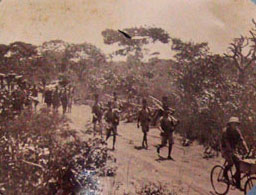Seminar: Forged in War: the Establishment of Colonial Rule in Zambia, 1890-1920

The territories that would make up what is today the Republic of Zambia officially became British in 1891. However, this did not equate to an on-the-ground presence of colonial authority capable of affecting the destiny and daily lives of people. Prof. Jan-Bart Gewald's work, as published in Forged in the Great War: People, transport, and labour, the establishment of colonial rule in Zambia, 1890 – 1920 (Leiden, 2015) indicates that the establishment of effective colonial rule in Northern Rhodesia only came about on account of the unique conditions that developed in the First World War (1914-1918); conditions that led to the massive application of human labour, obtained through the intercedence of Chiefs and Headmen in exchange for goods and money. Inadvertently this bound the Chiefs and Headmen ever further to the incipient colonial administration.
In contrast to the work of those who argue that the colonial state was threatened and nearly collapsed during the course of the First World War, Prof. Gewald argues that it was precisely on account of the war, and in particular the limitless funding made available by the War Office during the course of the war, that the British South Africa Company (BSAC) was able to establish an effective administration in colonial Zambia.
World War I did not weaken the colonial administration in Northern Rhodesia, instead it provided the BSAC with an opportunity to extend and impress its authority across the territory.
Prof. Gewald's book on this subject is entitled Forged in the Great War. People, transport, and labour, the establishment of colonial rule in Zambia, 1890-1920. It is published by the ASC as volume 61 of the African Studies Collection and can be ordered (€ 10,-) in the ASC bookshop. Download the book here.

Jan-Bart Gewald is a historian specialized in the social history of Africa. He has been appointed Professor of the history of Southern Africa at the Institute of History, Leiden University as of 1 September 2013. His research has ranged from the ramifications of genocide in Rwanda and Namibia, through to the socio-cultural parameters of trans-desert trade in Africa. In addition, he has conducted research on pan-Africanism in Ghana, spirit possession in the Republic of Niger, Dutch development cooperation, Africa in the context of globalisation, and social history in Eritrea.
Furthermore he has a particular interest in archaeology, and has participated in archaeological research in southern Africa. Within the theme group Agency in Africa he is working on a project dealing with the social history of the motor car in Zambia in the 20th century.

